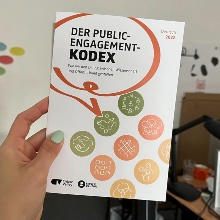“Public engagement involves the public and all so-called ‘relevant knowledge actors’ actively and continuously in science.“ This is how the first “Principles of public engagement“ begin, which were presented to the public at a Berlin Science Week event at the Museum für Naturkunde (Natural History Museum) on November 4, 2022. When communicating with and to the public, it has long been clear that research needs to involve society. The principles are intended to help establish and professionalize public engagement in Germany, so that cooperation between researchers and the public becomes an integral part of the research process.
“We are at the beginning of a bottom-up movement of many committed individuals who have the goal of making science more open,” says Rebecca Beiter from the University of Stuttgart, the Cyber Valley Public Engagement Manager. “In European research funding, public engagement and open science are now part of the criteria of scientific excellence. As a consequence, it’s expected that, in Germany, the interaction between scientists and other groups of society will – and must – increase. With the principles of public engagement, we contribute to this dynamic by passing on the experience we have gained during our extensive public-engagement work in our research network over the past two and a half years. The guideline represents what the public-engagement community in Germany is committed to.“
The principles of public engagement were created by Cyber Valley, the Berlin School of Public Engagement and Open Science in the Museum für Naturkunde, the Public-Engagement Code of Conduct Working Group as well as (science) communication professionals. The text describes a vision, a mission as well as principles, and it shows what public engagement can achieve in a democratic society. The principles are an important basis for practicing public engagement in Germany and are aimed at those who want to pursue and promote public engagement in science as well as separate it more from science public relations. The principles build on existing guidelines for science communication and adds to them the perspective of what principles public engagement is using to shape the dialog in Germany. The document will be revised annually based on input from the community. The next version is scheduled to be published in October 2023.
“The Berlin School is very proud to be a co-initiator and host for the launch of the public engagement principles,” said Anna-Zoë Herr, Public Engagement Coordinator at the Berlin School of Public Engagement and Open Science. “We were able to benefit from the international experience of our team, so that public engagement can establish itself as a field and be practiced in the German research landscape. We need a cultural change, which we, at the Berlin School, want to promote vigorously. The principles are the first step toward that.”
About Cyber Valley:
Cyber Valley is Europe’s largest research consortium in the field of artificial intelligence with partners from science and industry. The state of Baden-Württemberg, the Max Planck Society with the Max Planck Institute for Intelligent Systems, the Universities of Stuttgart and Tübingen, as well as Amazon, BMW AG, IAV GmbH, Mercedes-Benz Group AG, Dr. Ing. h.c. F. Porsche AG, Robert Bosch GmbH, and ZF Friedrichshafen AG are Cyber Valley’s founding partners. In 2019, Fraunhofer-Gesellschaft also joined Cyber Valley as a partner. Moreover, Cyber Valley also receives support from the Christian Bürkert Foundation, the Gips-Schüle Foundation, the Vector Foundation, and the Carl Zeiss Foundation.
About Cyber Valley Public Engagement:
When conducting research in the field of Artificial Intelligence (AI), Cyber Valley would like to see ethical principles and social impacts being taken into account. We therefore invite you to our dialog formats, which take place on a regular basis. Our goal is to make our research more open and to enable an exchange between AI researchers and the public.
About the Berlin School:
The Berlin School of Public Engagement and Open Science is a cooperation between the Museum für Naturkunde Berlin, the Humboldt University of Berlin, and the Robert Bosch Foundation within the framework of the Berlin Science Campus. The Berlin School enables and strengthens communication of and through research. In particular, it helps scientists and their publics deal with research and research processes interactively and in a context-aware approach. To this end, the School sees itself as a hub for all public-engagement actors.
| Contact | Lennart Schmid, Cyber Valley Communications Manager, E-Mail, Phone: +49 7071 6011544 |
|---|



